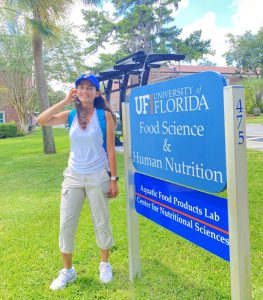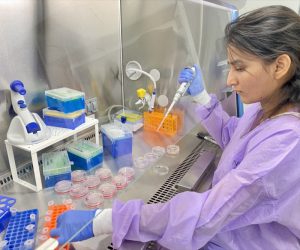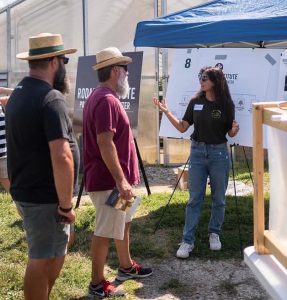 Join us for another installment of FSHN Research Journeys, which follows the research of graduate students in the Food Science and Human Nutrition program at The University of Florida. Today’s guest poster is Nikita Bhusal, a first-year Ph.D. student in food science. Nikita is working in the lab of Dr. Naim Montezeri developing techniques to prevent foodborne viruses like norovirus in the fresh produce supply chain. In this article, learn more about her crucial work and her inspiration for pursuing food safety research.
Join us for another installment of FSHN Research Journeys, which follows the research of graduate students in the Food Science and Human Nutrition program at The University of Florida. Today’s guest poster is Nikita Bhusal, a first-year Ph.D. student in food science. Nikita is working in the lab of Dr. Naim Montezeri developing techniques to prevent foodborne viruses like norovirus in the fresh produce supply chain. In this article, learn more about her crucial work and her inspiration for pursuing food safety research.
Nikita: Since 2020, the virus that caused the COVID-19 pandemic has shown us how viruses can interrupt our way of living. A virus particle, called a virion, can cause disease and multiply to infect more people. Viruses do not live on their own but enter living host cells and hijack the cellular machinery to replicate. The human body harbors more than 300 trillion viruses.1 However, not all of them cause disease; in fact, many of these viruses protect our body from infection and help boost our immunity.
The Burden of Norovirus on Food Safety

Norovirus is a leading cause of gastrointestinal infections that cause diarrhea and vomiting. The Centers for Disease Control and Prevention (CDC) ranks norovirus as a top cause of foodborne illnesses globally, causing approximately 600 million cases annually. According to the CDC, 2,500 reported norovirus outbreaks occur in the United States annually, which accounts for 58% of foodborne illnesses. Moreover, it is estimated that norovirus infections in the United States cost approximately $7.6 million in direct medical costs and about $165.3 million in productivity loss each year.2
Norovirus is highly contagious and transmitted via fecal-oral routes, direct person-to-person contact, or contaminated food and water routes. The CDC suggests that the most common settings for norovirus outbreaks are where there is close contact between people, such as in healthcare facilities, food service kitchens, cruise ships, schools, and long-term care facilities. The virus is often found in undercooked or ready-to-eat foods like leafy greens (lettuce, salads, spinach), fresh-cut fruits, frozen berries, and seafood (shellfish, oysters).
Contamination in fresh fruits and vegetables usually occurs during preharvest operations (contaminated irrigation water, contaminated manure, natural disasters, water runoffs) and post-harvest practices (cross-contamination through food handlers, contaminated tools, fecal contamination, unsafe transportation, and storage practices). Despite several studies investigating vaccine development, an effective norovirus vaccine still does not exist. The reason is primarily due to the high genetic variability among norovirus strains. Therefore, my research focuses on preventing norovirus contamination in fresh produce during pre-harvest and post-harvest stages before it reaches the consumer’s table.

My Journey to the University of Florida

Food safety is a significant issue in my country, Nepal. Being a developing country, food surveillance, food safety outreach programs, and, most importantly, research on food safety is extremely limited. To address this issue, I decided to pursue higher studies and get involved in food safety research. In my master’s degree program at Lincoln University of Missouri, I studied the development of a biological method to control and prevent the contamination of pathogenic E. coli in fresh vegetables.
During this research, I grew more intrigued with the field of food safety because providing safe food practices not only protects people from illnesses but can also reduce food insecurity by saving foods from being recalled and wasted. My research is even more interesting as it involves studying the unique characteristics of these tiny “super-bugs”, or viruses.
For my doctoral studies, the University of Florida was an ideal choice as the university provides abundant opportunities for graduate students seeking a world-class education. The Food Science and Human Nutrition Department has exceptional research and outreach programs. In addition, UF offers enormous resources for graduate students to expand their horizons beyond the knowledge they gain by working on their research projects.
Norovirus Mitigation in Fresh Produce

My research is focused on studying the persistence and mitigation of human norovirus in fresh produce, agricultural soil, and water. I am looking for the factors in preharvest and post-harvest operations of fresh produce which are primarily responsible for norovirus contamination. My project involves three major objectives:
- Pre-harvest: Persistence and inactivation of norovirus in agriculture water.
- Norovirus persistence in soil and decaying vegetative matter and investigating potential contamination routes.
- Post-harvest: Norovirus transfer in crops during post-harvest sanitation.
I will be studying methods of using chemical sanitizers in agricultural water, which is a major contributor to food contamination. Identifying the efficacy of using chemical sanitizers and their minimum concentrations to mitigate potential contamination of fresh food are two of the major tasks in my research. In addition to controlling contamination through agricultural water, I am also responsible for studying the prevalence of post-harvest contamination as well as developing sanitary measures to prevent cross-contamination.

My research is crucial for both me and the community. I have always aimed to work in the food safety area and contribute toward maintaining community health. While food safety is important from a public health perspective, it has not been recognized as critical for a sustainable food system. Moreover, research into foodborne viruses is lacking; therefore, my research is essential for global sustainability.
Considering Norovirus Complexity While Filling in Research Gaps
Human norovirus is one of the major foodborne viruses and is a complex virus to study. The major challenge of norovirus research is that the virus is difficult to culture in a laboratory. Because of its rapidly evolving genetic diversity, the virus is hard to grow, which is why surrogate viruses are often used.3
In my study, I will use the Tulane virus, which belongs to the same Caliciviridae family as norovirus. This virus has been used in previous studies as it has similar genome characteristics to norovirus and has a larger genetic variability to study in vitro models as well.4 Moreover, the Tulane virus can be grown in cultured cells, which makes it easier to study than the non-culturable human norovirus.4
Overall, with scientific advancements, the gaps in norovirus studies and its molecular epidemiology are being intensively studied. This globally omnipresent virus can only be contained with the collaborative efforts of funding agencies, governmental bodies, academic institutions, and the scientific community.
Nikita Bhusal is a first-year Ph.D. student in the department of Food Science and Human Nutrition at the University of Florida. Nikita’s research interest is focused on controlling and preventing foodborne viruses in fresh produce using chemical sanitizers. She is working on a research project funded by the USDA-SCRI (United States Department of Agriculture-Specialty Crop Research Initiative) collaborative CONTACT project under the supervision of Dr. Naim Montazeri. This research aims to bring stakeholders, researchers, academics, and extension officers together to assess the health, economic, and risk impacts of food safety systems in produce supply chains.

References
- Pride D. Viruses Can Help Us as Well as Harm Us. Scientific American. doi:10.1038/scientificamerican1220-46
- Tan M. Norovirus Vaccines: Current Clinical Development and Challenges. Pathogens. 2021;10(12):1641. doi:10.3390/pathogens10121641
- Jones MK, Watanabe M, Zhu S, et al. Enteric bacteria promote human and mouse norovirus infection of B cells. Science. 2014;346(6210):755-759. doi:10.1126/science.1257147
- Drouaz N, Schaeffer J, Farkas T, Le Pendu J, Le Guyader FS. Tulane Virus as a Potential Surrogate To Mimic Norovirus Behavior in Oysters. Appl Environ Microbiol. 2015;81(15):5249-5256. doi:10.1128/AEM.01067-15
Looking for more posts exploring graduate research projects in the Food Science and Human Nutrition Department at the University of Florida?
Dive into the Research Journeys of other graduate students below.
M.S. Food Science
M.S. Nutritional Sciences
Ph.D. Food Science
Ph.D. Nutritional Sciences
 11
11
